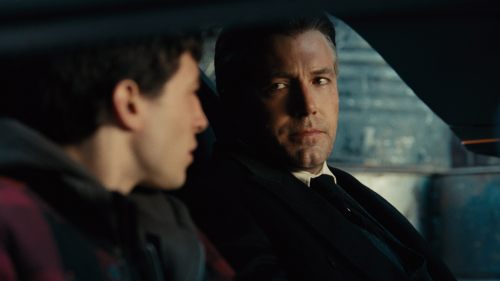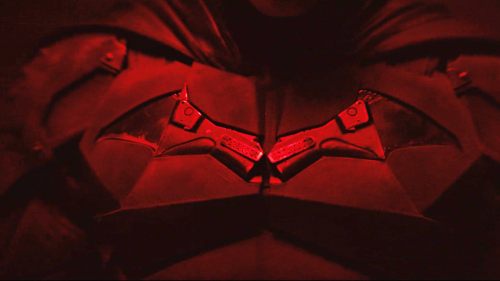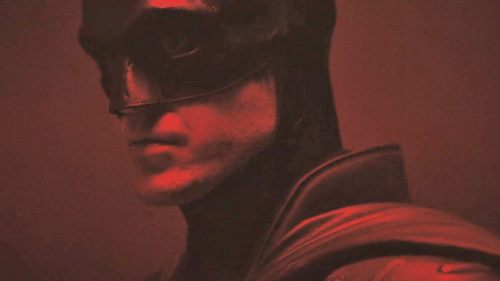What Is The Role Of Batman In The Age Of Trump?
It’s a funny time for Batman. Not funny in the sense that you want to bowl over laughing at the thought of the Caped Crusader, unless you’re talking about the upcoming Lego Batman Movie, which I assume will have one or two more jokes than Batman v Superman: Dawn of Justice did. No, this moment is peculiar for Batman. The DC Cinematic Universe hasn’t quite found its creative footing, the upcoming Ben Affleck Batman solo film is actively looking for a director, and the current president of the United States seems to fancy himself a bit of a Batman-esque authoritarian vigilante. Of course, Bruce Wayne would never wear such ill-fitting suits in public.
Scott Wampler wrote a really smart piece for this very website earlier in the week which deflated some particularly bizarre rumors about who will take the Batman gig. As he correctly pointed out, it’s not an ideal situation for established filmmakers. This is not Tim Burton or Chris Nolan remaking Batman in their image. Instead, the job is akin to a director airlifting into a long-running TV series and being given a bunch of notes on where to place the camera. This is why Marvel hires people like the Russo brothers and Jon Watts. They can work within the system and play by the rules.
From the outside looking in, DC’s issue seems to be that they don’t have the rules sorted out yet. Marvel had Iron Man to set the stylistic template necessary to launch a franchise. As we’ve seen from the wildly divergent BvS and Suicide Squad, DC is trying to start making money now and figure out their tone later. That makes the Batman job tough. It’s even tougher when we ask the question, what does Batman even mean in 2017?
The enduring icons of fiction reflect the times, which is why they endure in the first place. James Bond, Batman, Star Trek, and countless other franchises are malleable. They can adapt to the hopes and fears of a generation. Batman could be a camp figure in the ‘60s, a crypto-fascist with multiple personality disorder in the ‘80s and ‘90s, and a navel-gazing stand-in for America’s psyche during the War on Terror in the last decade.
The Batman we saw in BvS was mostly a pissed-off xenophobe with a barely restrained bloodlust and a penchant for lashing out at anyone who didn’t agree with his twisted worldview. Sound familiar? By the end of the film, Bruce Wayne is in mourning for his best friend of about 40 minutes and committed to putting together a team of superheroes to combat alien threats to Earth. That’s fine and dandy for an ensemble film like Justice League, but placing Batman into a solo film context requires heftier thematic material. There needs to be a reason for Batman to exist as the protagonist of a movie other than the financial imperative of having a Batman movie to sell toys. We all saw what happened when that particular scenario played out.
One of the more tantalizing options for a solo Batman film is a stripped down, noir-ish approach. With the assassin Deathstroke having already been announced as a villain in The Batman, that seems likely. What we have yet to see from a Batman movie adaptation is a small-scale thriller — a genre Batman is ideally suited for. As outrageous and cosmic as the other DC films have been so far, it would be a welcome change of pace to watch an entry that takes place primarily at street level. Imagining a film like The Raid or Dredd starring Batman is incredibly appealing, but it doesn’t solve the problem (and trust me, it is a problem) of how to adapt this character to a modern context.
Every decade or so, these enduring characters run the risk of fading into irrelevance. It sounds outrageous to assume that Batman or Superman could ever disappear from the greater cultural consciousness, but the historical precedent is there. Hollywood has tried numerous times to resurrect Tarzan and make Edgar Rice Burroughs’ creation palatable for contemporary audiences. They failed yet again last summer, with the turgid Legend of Tarzan. No amount of Samuel L. Jackson could scrub the colonialist origin of Tarzan from the story. Despite the best efforts of studio heads, Flash Gordon, John Carter, The Shadow, The Phantom, Conan, and other pulpy, pre-Marvel/DC characters haven’t been able to make a dent on the big screen in the last 40 years. Such a fate could befall any long-running franchise if it doesn’t receive the proper care.
Former James Bond writers Neal Purvis and Robert Wade recently acknowledged the difficulty in adapting Bond to a post-Trump, post-Brexit world. Bond is the ultimate symbol of authority, a hard-drinking defender of the status quo. A portion of Bond’s dedicated fanbase probably isn’t feeling very patriotic these days. As I pointed out earlier, Batman looks a bit like Mr. Trump from certain angles, and Trump’s approval rating isn’t exactly stellar.
Authoritarian Batman might have had a subversive, satirical appeal in the Reagan ‘80s, but it almost seems quaint today. The Nolan Batman who questions the usefulness of his mission isn’t appropriate anymore either. At his core, Batman is a guy who, through tragedy, realizes that the system that is supposed to protect the helpless is failing — thanks to corruption, ineptitude, or outright malice. Batman’s an outsider, and each individual creative team responsible for telling Batman stories has to reconcile that status. Miller’s Batman becomes a bully. Burton’s Batman retreats inward and emphasizes his eccentricity. Nolan’s Batman becomes obsessive and melancholy. Various other interpretations, from Denny O’Neil’s ‘70s run to the Bruce Timm cartoons, compartmentalize the two sides of the character — the establishment figure of Bruce Wayne and the rogue Bat.
But Donald Trump fancied himself an outsider, too. He still does, even as president. Maybe that’s the greatest strength of America, and also its ultimate weakness. If everyone — liberal, conservative, indifferent — fancies themselves a rebellious iconoclast with ambitions to save the world, then compromise isn’t possible. Batman, like so many pulp heroes, is a moral absolutist.
There are great Batman stories about him questioning his convictions — The Dark Knight, for starters — but the root of the character is in a stringent belief about what is right and what is wrong. Star Trek is about compromise and common ground. Superhero narratives are usually about destroying your enemy by any means necessary, but the limits placed on superheroes are what keep them from becoming villains. That’s what defines Batman, even more so than his position as an outsider. There are simply things he won’t do, even in the face of unspeakable evil. He sees the line and refuses to cross it. I hope that whomever is chosen to direct The Batman remembers that.



